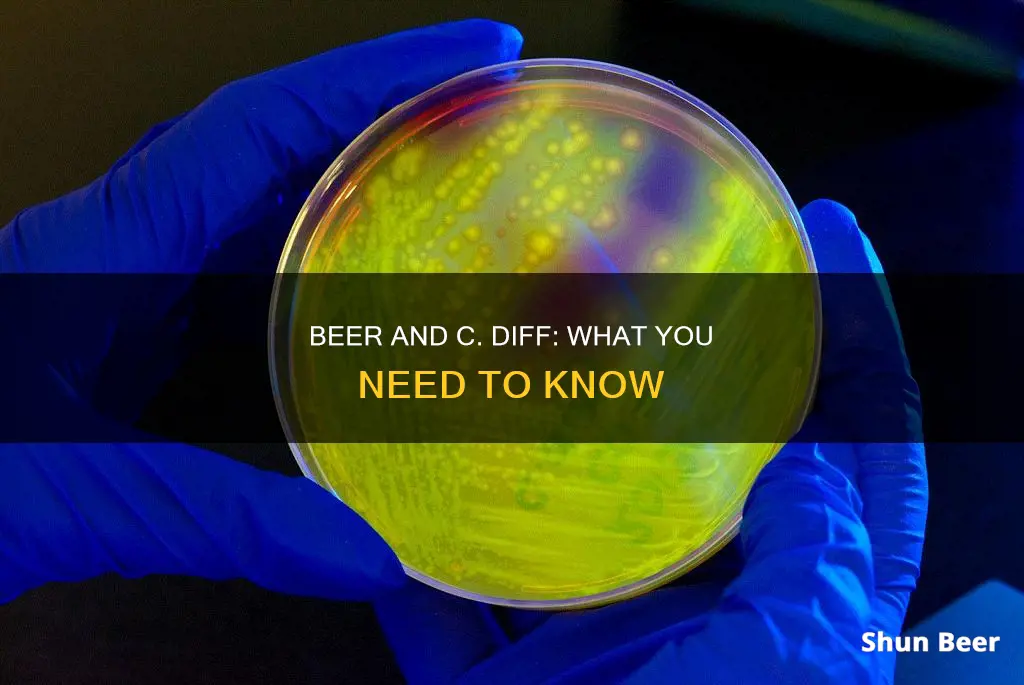
Clostridioides difficile (C. diff) is a harmful strain of bacteria that can cause severe diarrhoea, nausea, fever, and stomach pain. The infection is often treated with antibiotics, which can be tough on the body and should not be overused. While there is no explicit prohibition on drinking beer while being treated for C. diff, it is advisable to refrain from alcohol consumption. This is because alcohol can cause side effects similar to those of antibiotics, such as stomach upset, dizziness, and drowsiness, and can also reduce energy levels and delay recovery from illness. Furthermore, alcohol may impede the recovery process and decrease the effectiveness of certain antibiotics.
| Characteristics | Values |
|---|---|
| Should you drink beer while having C. diff | No |
| Reasoning | Alcohol can cause similar side effects to antibiotics, such as stomach upset, dizziness and drowsiness. Alcohol can also reduce your energy and delay how quickly you recover from illness. C. diff infections can cause severe diarrhea, which can lead to dehydration, and alcohol will only make this worse. |
What You'll Learn
- Alcohol and antibiotics don't mix well and can cause side effects like stomach upset, dizziness and drowsiness
- C. diff is associated with severe diarrhoea, which can lead to dehydration, so drinking lots of water is important
- Alcohol can reduce your energy and delay recovery from illness
- C. diff is often treated with antibiotics, which can upset the balance of good bacteria in your gut
- Doctors recommend a diet of soft, easy-to-digest foods during C. diff treatment

Alcohol and antibiotics don't mix well and can cause side effects like stomach upset, dizziness and drowsiness
Drinking alcohol while taking antibiotics is not recommended due to the harmful interactions and side effects that can occur. Alcohol can cause similar side effects to antibiotics, such as stomach upset, dizziness, and drowsiness. When combined, these side effects may be amplified or cause additional side effects like vomiting, headaches, and potentially life-threatening seizures.
Alcohol can also negatively impact the effectiveness of antibiotics. It can reduce their ability to fight bacterial infections and slow down the recovery process by affecting blood sugar levels and weakening the immune system.
It is generally advised to avoid alcohol until you have completed your course of antibiotics and are feeling better. This is especially important if you are taking antibiotics that are known to have severe reactions with alcohol, such as Metronidazole, Linezolid, Sulfamethoxazole, and Trimethoprim.
Therefore, it is best to refrain from consuming alcohol while taking antibiotics to avoid adverse effects and ensure the effectiveness of your treatment.
Beer and Guaifenesin: Safe Mix or Health Risk?
You may want to see also

C. diff is associated with severe diarrhoea, which can lead to dehydration, so drinking lots of water is important
C. diff is a type of bacteria that can cause severe diarrhoea, nausea, fever, and stomach pain. The people most vulnerable to C. diff infection are those in medical care who require antibiotics for an extended period. Older individuals may also be at increased risk.
C. diff's main symptom is severe diarrhoea, which can lead to dehydration and an inability to absorb the nutrients in food. Dehydration is a common side effect of watery diarrhoea, so fluid intake is very important. Doctors usually advise drinking lots of water to help avoid dehydration.
Drinking alcohol while taking medications can be harmful. If you are on medication, you are likely to be suffering from an illness that requires appropriate rest and treatment. Antibiotics are often used to treat C. diff, and as a powerful drug, they can be tough on your body and should not be overused. Antibiotic use is associated with a very serious opportunistic infection called C. diff, which causes severe diarrhoea and may lead to colon damage or death.
Most antibiotics are prescribed on a short-term basis, and it is best to temporarily avoid alcohol until you are no longer taking your medication. Heavy drinking may impair immune system function, making it more difficult to recover from infection. Alcohol can also cause side effects such as stomach upset, dizziness, and drowsiness, and when combined with antibiotics, these side effects may increase. Alcohol can also reduce your energy and delay your recovery from illness.
Therefore, if you are being treated for C. diff, it is important to drink lots of water to stay hydrated and avoid alcohol until you have finished your antibiotics and are feeling better.
Beer and Omeprazole: Is It Safe to Drink?
You may want to see also

Alcohol can reduce your energy and delay recovery from illness
Alcohol can negatively impact your energy levels and recovery from illness in several ways. Firstly, it reduces your liver's ability to produce blood sugar, which is necessary for energy. Alcohol also affects your body's absorption of essential nutrients such as zinc, vitamins B1 and B12, and testosterone, all of which play a role in maintaining energy levels and overall health. Additionally, alcohol can cause dehydration, further contributing to fatigue and reduced physical performance.
Alcohol can also disrupt your sleep quality, leading to decreased energy levels. It reduces rapid eye movement (REM) sleep, causing you to wake up feeling drowsy and low in energy. Alcohol consumption can also decrease muscle protein synthesis and increase muscle damage, impairing your body's ability to repair and recover. This is especially important for athletes or individuals undergoing physical training, as alcohol may hinder their performance and delay recovery from intense exercise. Furthermore, alcohol may increase inflammation and alter immune function, which can further delay recovery from illness or injury.
To maintain optimal energy levels and support timely recovery, it is advisable to avoid or minimize alcohol consumption, especially when dealing with an illness or injury.
Passover Beer: What Jews Can Drink and Avoid
You may want to see also

C. diff is often treated with antibiotics, which can upset the balance of good bacteria in your gut
Broad-spectrum antibiotics, which target a wide range of microorganisms, are ineffective against C. diff but can deplete the gut microbiome by killing off beneficial bacteria. This allows C. diff to proliferate and cause an infection. It is important to only take antibiotics when necessary and for the shortest duration required.
The type of antibiotic prescribed can also make a difference in the risk of developing a C. diff infection. For example, a 2023 study suggested that clindamycin and later-generation cephalosporin antibiotics posed the greatest risk for C. diff infection, while minocycline and doxycycline were associated with the lowest risk.
When treating a C. diff infection, it is crucial to choose an antibiotic that specifically targets C. diff, such as fidaxomicin or oral vancomycin. However, even with treatment, about one in five people will experience a recurrence of the infection. In such cases, fecal microbial transplants (FMT) are considered the gold standard treatment.
Beer Drinking: Blood Sodium Drop?
You may want to see also

Doctors recommend a diet of soft, easy-to-digest foods during C. diff treatment
A C. diff diet should include:
- Probiotics: Probiotics are friendly bacteria that can help prevent C. diff and restore good gut bacteria. Probiotic foods include fermented foods such as yogurt, kefir, sauerkraut, and miso. Probiotic supplements may also be beneficial, but it is important to consult a healthcare provider before taking any supplements.
- Liquids: Drinking plenty of liquids, especially water and broth-based soups, is important to avoid dehydration caused by diarrhea.
- Soluble fiber: Foods containing soluble fiber may help flush out the C. diff bacteria. These include oats, barley, beans, strawberries, apple pulp, and citrus fruits.
- Lean protein: Lean protein sources such as turkey, chicken, and eggs are easy to digest and provide essential nutrients.
- Non-cruciferous vegetables: Well-cooked non-cruciferous vegetables such as beets, green beans, zucchini, cucumbers, and celery are gentle on the stomach and provide important nutrients.
- Starchy foods: Starchy, easy-to-digest foods such as potatoes, noodles, crackers, and white rice can help bind stools and reduce diarrhea.
It is important to note that there is limited research on the effectiveness of diet in treating C. diff. However, healthcare providers may recommend this diet to help manage symptoms and restore good gut bacteria. It is always best to consult with a healthcare provider and a registered dietitian to determine the exact eating plan during C. diff treatment.
Drinking Beer in the Back Seat: What's the Law?
You may want to see also
Frequently asked questions
It is not advisable to drink beer or any other kind of alcohol while you have C. diff. Alcohol can cause similar side effects to the condition, such as stomach upset, dizziness and drowsiness, and may increase the severity of these symptoms. Alcohol can also reduce your energy and delay your recovery from illness.
C. diff is a type of bacteria that can cause severe diarrhoea, nausea, fever and stomach pain. It is often associated with antibiotic use and mainly affects those in medical care and older individuals.
C. diff is treated with specific antibiotics to stop the bacteria from multiplying. Treatment may also include surgery, digestive enzyme use, or a faecal microbiota transplant (FMT).
Doctors recommend eating soft, easy-to-digest foods during a C. diff infection, as well as drinking plenty of water to avoid dehydration. It is also important to eat foods that can repopulate your gut with good bacteria, such as probiotics, vitamin D, fibre, protein-rich foods, non-cruciferous vegetables, and starchy foods.







